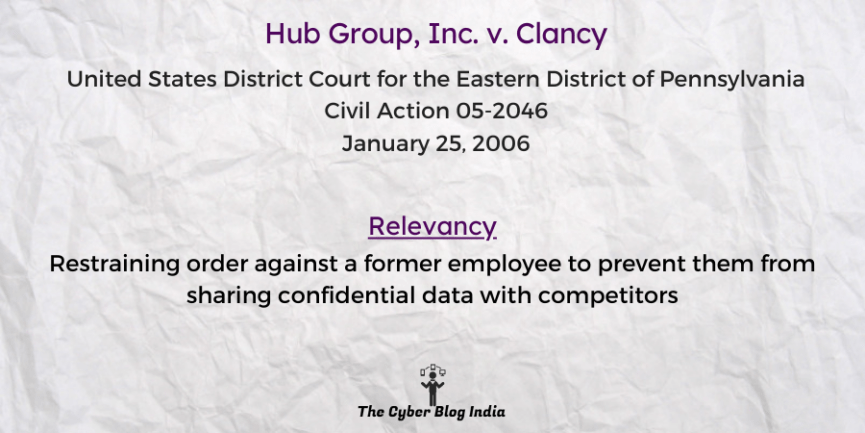Hub Group, Inc. v. Clancy

Hub Group, Inc. v. Jeffrey M. Clancy
In the United States District Court for the Eastern District of Pennsylvania
Civil Action 05-2046
Before District Judge L.F. Stengel
Decided on January 25, 2006
Relevancy of the Case: Restraining order against a former employee to prevent them from sharing confidential data with competitors
Statutes and Provisions Involved
- The Computer Fraud and Abuse Act, 18 U.S.C. § 1030
Relevant Facts of the Case
- While employed by the plaintiff company, the defendant had access to their electronic database containing detailed customer information.
- While the defendant had no employment agreement with the plaintiff, he had signed a confidentiality agreement.
- The defendant later resigned from the plaintiff company and started working for their direct competitor.
- After the defendant’s resignation, the plaintiff company found that the defendant had shared certain confidential information while employed by the plaintiff company.
- Moreover, after switching the job, the defendant solicited a customer of the plaintiff company but testified that he used no confidential information of the plaintiff company.
- The court entered a temporary restraining order against the defendant, which he has challenged in the instant appeal.
Prominent Arguments by the Advocates
- The plaintiff’s counsel argued that it would suffer severe financial injury if its protected information was made known to its competitors.
- The defendant’s counsel contended that the plaintiff failed to show irreparable harm. They have not shown actual damages to the database or actual losses due to his actions.
Opinion of the Bench
- The plaintiff could plead a cause of action under the Computer Fraud and Abuses Act as the defendant exceeded the scope of his authorisation into the plaintiff’s database.
- While a threat of harm may exist, the plaintiff has not shown the existence of irreparable harm, which is essential to granting a preliminary injunction.
- Data taken by the defendant is already obsolete due to fluctuating fuel prices and other general rate changes.
Final Decision
- The court denied the plaintiff’s request to grant a preliminary injunction.
Satvik Mishra, an undergraduate student at the Rajiv Gandhi National University of Law, Punjab, prepared this case summary during their internship with The Cyber Blog India in May/June 2022.
